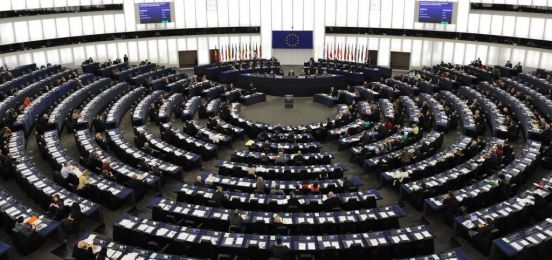Florian Irminger, Head of Advocacy at HRHF, continued: “MEPs were not duped during the so-called liberalisation period in Belarus during these past months, and continue to stick to their principles.”
On 6 April, the European Parliament adopted a resolution condemning the recent crackdown on peaceful protesters and undue restrictions on the right of peaceful assembly, freedom of expression, and freedom of association in Belarus, and expressing concern over a new wave of repression.
This follows the weekend of 25–26 March, when the Belarusian authorities showed the true face of systematic repression in the country and arrested and in some cases violently attacked peaceful protestors.
MEPs warned that the EU may impose new restrictive measures if the Belarusian authorities fail to investigate all allegations connected with the recent demonstrations. The EU lifted most of the restrictive measures against Belarusian officials in February 2016 “as a gesture of goodwill to encourage Belarus to improve its human rights, democracy and rule of law record.”
During the debate on the resolution, MEP Petras Austrevicius (ALDE/Lithuania), lambasted the lack of positive steps by the Belarusian government in response to the lifting of EU sanctions: “Elections in September rigged, not a single political prisoner rehabilitated, UN Special Rapporteur continuously ignored, death penalty never abolished and they keep executing people… As we speak around 20 people remain arrested and may become new political prisoners. This is how dictators reciprocate.”
“Real change in Belarus can only be achieved through sustained and coordinated international pressure, in which the European Parliament, together with the UN Human Rights Council, is a key actor, commented Florian Irminger. “However, other EU institutions have so far failed in sending clear warnings to the Belarusian authorities.”
Human Rights House Foundation and its partners from the Belarusian Human Rights House are in Brussels this week to call on EU institutions and States to follow the lead set by this resolution and formulate similar clear calls toward the Belarusian authorities. HRHF, with the support of its Belarusian partners, has prepared an April 2017 briefing note on the human rights situation in Belarus, in which it provides recommendations to the EU.
Significantly, the resolution by the European Parliament highlights the important work of the UN Special Rapporteur on Belarus. It calls on the Belarusian authorities to fully cooperate with the mandate holder, and on the EU and its Member States to promote and support the extension of the mandate, which is the only independent international monitor of human rights in Belarus. The UN Human Rights Council is due to adopt a resolution to renew the mandate in June 2017.
The European Parliament resolution also calls on the European External Actions Service (EEAS) to set clear benchmarks in its relations with Belarus, which should apply consistent conditions on human rights in order to ensure Belarus adopts reforms that protect fundamental freedoms and human rights.
MEP Pavel Telicka (ALDE/Czech Republic), strongly supported such conditions during the debate, and called for the reintroduction of sanctions: “Conditionality has to apply: we have lifted sanctions, we have provided concessions, we expected changes. Those have not arrived, there is a crackdown, so we reintroduce sanctions. This time they have to be harder. Once we will see concrete changes, reforms, we can act. But at the moment there is no other action than take a very hard and tough stand.”
While the resolution did not call for the return of sanctions, it did outline a strong position. MEP Bogdan Zdrojewski (EPP/Poland), said: “Today we have a resolution in which we are not calling for the return of the sanctions against Belarus, but we are warning that the road they are on and the repression against the opposition and society may also end in a resolution calling back for sanctions.”
The resolution also calls on the EEAS and European Commission to continue and strengthen support for civil society organisations in Belarus and abroad, stressing the need to support all independent sources of information for Belarusian society.
Recent protests in Belarus were directed against the adoption of a Presidential Decree introducing a so-called “social-parasite tax,” designed to penalise unemployment with fees and forced labour. The European Parliament resolution recommends the repeal of the Presidential Decree as an arbitrary, harsh, and morally questionable measure, violating international human rights, which is estimated to affect more than 470 000 Belarusians.
Documents:
- Briefing note on Belarus April 2017: A system that allows human rights violations at any given time
This April 2017 briefing note on Belarus was prepared by Human Rights House Foundation with the support of the Barys Zvozskau Belarusian Human Rights House.
More on recent arrests and attacks on peaceful protestors in Belarus
True face of Belarus: Systematic repression
Belarus: Prominent human rights defender detained as protests continue
Civic Solidarity movement condemns detentions and violence against protestors
Belarus detains dozens amid “social parasite” protests
EU and Belarus
In November 2016, the EU Parliament maintained its principled position in a resolution on Belarus.
In May 2016, on the eve of EU-Belarus human rights dialogue, Belarusian human rights organisations announced a joint position on the human rights observance in Belarus.





